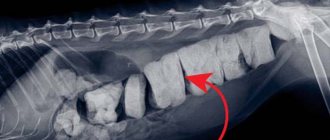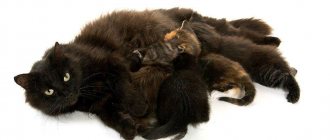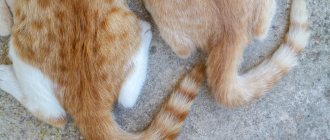At what age does a cat start asking for a cat?
Puberty of a furry pet ends with the first heat. For everyone, this happens at its own time, but, as a rule, before the age of one.
That’s when it’s hard for the owner not to understand what’s going on. With the first heat, there comes a period when this behavior will occur regularly. There are a number of signs that make it clear that a person wants a cat for the first time.
- She screams shrilly. This is where natural instincts come into play, and you can’t go against nature. Wild cats call their partners with loud, heart-rending cries, indicating that they are ready to mate.
- Leaves marks everywhere. Estrus is always accompanied by discharge, which involuntarily remains where the pet has been. This is also inherent in nature to attract a male.
- There is a decrease in appetite or its complete absence only in conjunction with the above symptoms.
- Poses characteristic of mating. The cat raises her hindquarters and withdraws her tail, calling for a male.
- A pet asking for a cat becomes especially affectionate, can follow on the heels of the owner, rub against his legs, while raising her tail. However, all cats have different personalities, and this is reflected in their behavior during heat; your cute pet can become wild and aggressive.
Cat cycle length
When asked about the duration of the period when she asks the cat, characteristically raising her hind end, not a single veterinarian can answer accurately.
Approximately it is at least a week, but no more than ten days, and depends only on the pet’s body. Watch her and you will know exactly the cycle of your furry lady.
Many owners do not want to let their cat outside or bring in a male for mating. Everyone knows what consequences this leads to - several months of the whims of a pregnant cat, childbirth and caring for kittens. In addition, she can go for walks often: every 3-4 weeks . If such prospects do not inspire optimism, then sterilization measures should be taken or drugs that extinguish sexual instincts should be given.
Sterilization
Medicine does not stand still in “animal” matters. Here contraceptive methods come to the rescue of owners, allowing a cat to mate without bearing offspring; some owners choose them. Sterilization is the best option if you don’t want to watch her lift her hindquarters, you don’t need kittens and the pet’s periodic heart-rending screams.
Although a neutered cat will raise her hind end, this is an instinct. Previously, it was believed that it was better to let her give birth for the first time before surgery. But veterinarians have a different opinion: sterilize before birth.
Medicines
If you are against surgery, but listening to the cat's cries and seeing how the back end lifts is tiring, contact your pharmacists. In “cat” pharmacies you will find a number of drugs that will calm your pet’s sexual instincts. However, they should not be used frequently; consult your doctor regarding dosage and frequency.
The question remains: why does a cat lift his hindquarters? There is only one answer to it - strong sexual arousal. He can lean on his hind legs and lower himself onto his front legs. Try giving him sedatives as well.
Why a cat meows for no reason at night, as well as when it goes to the toilet for a long time or after giving birth, sitting by the door and in other situations, you can learn from this and other articles of this project, which is entirely dedicated to such cute and beloved pets .
Common questions are presented and comprehensive answers are given, which makes it possible to understand what is the reason for a cat's meowing in a given situation and how to deal with it.
Why does a cat meow when you pick it up and asks to be held?
Some cat breeds don't like to be held, so they start meowing. And if a cat has been trained to sit on arms since childhood, meowing, it attracts the owner’s attention to itself. Perhaps there is someone nearby whom the pet is afraid of, and, meowing, he seeks protection from his owner, asking to be held in his arms.
The cat meows at the front door, at the corner, birds, wall, mirror, ceiling
A cat may meow at the front door if it senses a cat there or asks to go outside. When a cat sits and meows on a corner, perhaps having smelled some kind of smell, she wants to go there to the toilet, but she understands that she can’t, so she meows. When a cat hunts birds and meows loudly, it means that it cannot catch the bird and, as it were, calls for helpers.
If a cat meows at a wall, perhaps she sees something there that a person cannot see. And there is only a mystical explanation for this. This can also explain the cat's meowing at the mirror. Or she saw her reflection in the mirror, so she talks to him. Shadows “run” on the ceiling, and the cat, watching them, can meow loudly.
The cat is yelling and wants to go outside, what should I do and why?
The cat asks to go outside for a walk for a reason: she urgently needs a cat. If the owners have no desire to subsequently treat the cat for various diseases, then it is better to endure this period and not let the pet outside. You can give your cat a special sedative or distract it with games.
The cat meows all night what she wants and how to calm her down
You should consult a specialist if your cat meows at night. If something hurts an animal, you need to start treatment on time. If the cat wants a cat and meows at night, you can let her out for a walk, but this is fraught with different consequences. Therefore, feed your cat a hearty dinner to keep her body busy digesting the food. And don’t let your cat sleep during the day, but rather play active games with her.
The cat meows without stopping and the reasons for what to do, a sign
If a cat meows constantly and for no apparent reason, it means that the owners have spoiled it with their attention and care. And thus the cat tries to attract attention all day long. Wait until your cat stops her cat songs before petting her. Perhaps the cat is in pain, so she calls for help. In this case, you need to show her to the veterinarian.
There is such a sign that if a cat in the house constantly meows, then big troubles will soon visit the house.
The cat meows all day long, what about a month?
Cats can meow for a long time if the owners have changed their place of residence. In a new apartment, everything is unfamiliar for a cat, and the pet may become stressed. Try to pay more attention to the cat, create a cozy nest for her from her favorite items. It’s good if there is some item left from the old apartment that has the smell of a cat on it. You can give your cat a sedative for a few days.
The cat meows in the toilet near the tray when he goes to the toilet, in the car, only in one room
The cat meows at the litter box because it is dirty, but she doesn’t want to get her paws dirty and demands the owner to clean the litter box. If your cat begins to meow when sitting on the tray, pay attention to your pet's feces and urine. The cat may have kidney disease or a bladder infection. If your cat has worms, she may also meow loudly when going to the toilet.
In a car, a cat may scream because it is afraid of confined spaces and lacks air, especially in the heat. A cat may behave tensely and start meowing in a certain room: once upon a time, the cat was accidentally left alone in this room for a long time, and she is afraid of repeating a terrible story for her.
The cat meows when no one is home
When all family members are at home, the cat is silent, and when left alone, it begins to meow. A cat may be bored alone and this is how she calls her owners. Also, the poor pet experiences fear from various sounds from the street or other apartments and meows anxiously.
The cat meows when you grab it by the belly and follows me
If your cat starts meowing loudly when you pick it up by the stomach, there is a reason to contact your veterinarian; the cat may be in pain.
When a cat constantly follows its owner, meows and tries to attract attention, it means the cat needs something. Most likely, she misses her owner and wants him to caress her. Or the cat is hungry and asks for food.
First heat. When does a cat start asking for a cat?
The first heat in domestic felines occurs after the animal has completed puberty.
This occurs at 6-10 months. The period when a cat begins to ask for a cat cannot be confused with anything else. Problems associated with estrus are familiar to every owner and evoke only negative memories for everyone. All this is due to the fact that cats very clearly express their desire to mate. It can be noticed by the following signs:
- Calling cries. To attract a mating partner, the cat meows loudly;
- Tags. The animal leaves “puddles” in the apartment, instinctively attracting the cat with its smell;
- Adopting a mating position. The pet falls on its front paws, raises the back of its body, moves its tail to the side, and rolls on the floor;
- Decreased appetite or lack thereof;
- Frequent urination;
- Aggression or, on the contrary, excessive displays of affection.
When a cat first asks for a cat, her body is not yet ready to bear and feed healthy offspring. Physiologically, the animal will be ready for the birth of kittens only at 16-20 months.
You can find out how many days a cat asks for a cat only by watching your pet. On average, this process lasts from 7 to 10 days. Estrus time may increase or decrease depending on many individual factors. But all the days of estrus, the pet will emit heartbreaking screams, constantly reminding the owner of her needs.
The majority of owners of furry pets are interested in the answer to the question - at how many months does a cat begin to ask for a cat, and what are the signs of the appearance of a desire to procreate. Typically, a cat's first heat begins to occur when the process of puberty is completed. In all animals, this process begins at different periods of their life; in a cat, this phenomenon usually occurs after the first six months of life and no later than 10 months.
If a cat wants a cat, the owner will undoubtedly be the first to know about it. It will be possible to determine immediately that this period has arrived and it is simply impossible to confuse this phenomenon with something else. Any owner of a domestic cat knows about the difficulties that arise during this period of the pet’s life. You can determine that a cat wants a cat for the first time by some signs that will be listed below.
At what age does estrus begin and in what case does a cat yell have been described, now it is necessary to indicate the signs of the animal’s sexual desire. Basically, at the age of 6-7 months, the cat shows the following signs of desire for a cat:
- During the period of heat, the cat screams wildly. For the first time it looks quite unusual and strange. However, all this is a natural instinct. The animal meows and screams loudly to attract a potential partner for mating.
- Marks appear throughout the apartment. It is not known for sure whether the cat does this on purpose, since during estrus the animal actively produces discharge. Maybe they appear on the floor involuntarily. However, there is a version according to which the cat leaves marks for the male in this way in order to attract him.
- After 6-7 months of life, when the cat begins the mating period, it takes on characteristic poses. The cat raises the back of its body while lowering itself onto its front paws. At the same time, she moves her tail to the side. This position is aimed at calling the male to mate.
- The animal's appetite decreases or completely disappears.
- The pet goes to the toilet very often.
- Also a characteristic sign of the onset of estrus is excessive petting of the animal. The cat purrs loudly and rubs against its owner's legs. However, a reverse reaction also occurs, accompanied by aggression.
All about domestic cats
Some representatives of the feline genus are distinguished by the amazing ability to scream and meow all day long. This condition confuses the owner of the animal. After all, it’s true that it can be impossible to guess why an absolutely healthy and neutered cat is yelling. Pets can meow loudly at any time. Some do this during the day. And there are situations when the cat constantly yells.
This is a common thing for Oriental breeds. But, as for ordinary breeds, there must be a reason for loud screaming and meowing. We will tell you why animals scream in this article.
There are many reasons for the above problem. It could be illness or simple sadness. If a cat screams loudly, you need to figure out the reason for this behavior.
During heat, unsterilized pets scream. Why do they do this? The animal experiences suffering not only psychologically, but also at the physiological level - this is a natural process. An uncastrated cat experiences similar suffering. A loud scream during mating is a signal to the opposite sex. A constantly screaming pet naturally causes discomfort among animal owners. But you can't argue with nature. What to do in this situation? There is only one option - gritting your teeth and waiting for the end of the period.
The cause of screaming is illness
An old cat may scream constantly due to Alzheimer's disease, a nervous disorder. Irreparable age-related changes occur in the body of an old animal. In this case, the owner should take the cat to the veterinarian. To alleviate the condition of the animal, there are drugs that can calm it down for a while. The reason for the need to scream loudly for older animals has been figured out. Why do young individuals make such sounds?
A young individual can make terrible screams due to injury and severe pain. It is likely that the cat is experiencing severe abdominal pain. If you notice a hard abdomen, you should immediately take the cat to a veterinary clinic.
Parasitic worms can cause pain in the intestines. This is why cats scream at night. The owner must systematically treat the animal for worms.
Pets suffering from urolithiasis experience severe pain. They meow pitifully and loudly when they try to go to the litter box. If the above symptoms are detected, you should consult a specialist.
Sterilization
Only sterilization will help you get rid of estrus forever and without consequences. Sterilization is an operation to remove organs responsible for reproduction. Sterilization is not carried out at home; you need to go to a veterinary clinic.
Previously, only cats had their ovaries removed. With the removal of the ovaries, the production of hormones that cause estrus stops. Now the uterus is also being removed to prevent the development of a tumor in it. You cannot sterilize a cat during heat; you should wait until it is over.
After sterilization, the cat does not ask for a cat for the rest of its life. Neutered cats are less aggressive and remain playful. The life expectancy of such pets is longer than their “full-fledged” relatives, since they are deprived of the risk of getting sick from “empty” heats and the drugs used by the owners to suppress them.
Attempt to attract attention
At times, the pet walks and screams for no reason. Why does he do this? Animals are trying to attract attention. Adults are clearly aware that people respond to loud meows and do everything to achieve what they want.
In some cases, with the help of an ora, a cat begs for a treat or food. If the reason for the scream is not clear, the pet should be fed. The reason for the screaming may be a long stay without the owner. With the help of an ora, he wants to attract the attention of the owner, thereby receiving his portion of love and care. You can calm down the fluffy by playing and talking to him. Important! You cannot leave your pet alone for a long period of time. When leaving home, provide your pet with the essentials - toys and food.
Fluffies quickly become attached to their owners. Therefore, if you leave an animal alone, the pets become gloomy and sad.
Solution
If an unexpectedly quiet cat starts yelling, you should seek help from a veterinarian. Adequate therapy will help get rid of the heart-rending scream and help the pet.
The cat screams at night because it is difficult to cope with the need to reproduce.
For this purpose, there are many hormonal drugs that help reduce the sexual desire of pets. Hormonal treatment is harmful to the health of the animal. The best option is to release the cat and let him walk. After completing urgent matters, it is recommended to castrate the individual.
If the animal continues to meow loudly and does not allow you to sleep peacefully, you can use the following recommendations:
- Throughout the day, try to devote a lot of time to the animal - actively play with it and force it to hunt. Simulating a hunt satisfies the predatory instincts of your pet.
- After completing the play activity, the animal should be fed well, preferably with meat. After hunting and eating the “prey” the animal should fall asleep soundly.
- Try not to let your pets sleep in the evening.
- From the first day, try to teach the kitten to sleep in its place. It should be separate and located in another room. In cases where the screams are unbearable, the cat can be locked in another room, leaving water and a tray for it. But such drastic measures should be taken only in special cases.
If there are suspicions that the cat is yelling not because of illness or injury, but because of a bad mood, it is recommended to give him sedatives based on herbal components. They are harmless to the animal and help to calm the pet.
Calming a cat in heat
In one of the sections of the article, signs were described by which one can determine whether a cat is in heat or not. However, there are also furry pets whose estrus is either not accompanied by such signs at all, or they pass completely unnoticed. By the way, there are also cat owners who manage to ignore these signs.
However, if the animal is in mating season, there are sedatives for cats in heat, which are listed below:
- Isolate the cat in a room with food and water, a tray and a bed, and let it out only in the evening.
- Turn on classical music (Beethoven, Bach), since a number of studies have proven the calming effect of certain melodies on both humans and animals.
- Apply pheromones. While they may not help most cats, they do have a positive effect on some furry pets.
- Homeopathic remedies may help.
- Suprastin, which is a hormonal agent, has proven itself well.
- The most effective and harmless remedy is the use of herbal sedatives.
- Other hormonal drugs that can be purchased at pet stores and veterinary pharmacies. However, before doing this, you should definitely consult a specialist to know their correct dosage and method of use.
Let's move on to consider medications that prevent cats from going into heat.
Features of cat behavior
The behavior of cats is determined by the character of the animal itself. Four-legged friends, like people, can be talkative or silent. Some pets experience their shocks on their own, others walk around the apartment and complain to the owner, constantly meowing.
Don’t mistakenly assume that your furry friend is screaming because he’s being mean. There is always a reason for this behavior, you just need to dig deeper. The owner, in turn, must do everything to ensure that the animal calms down.
If you have never raised cats before or have kept the animal in permissive conditions, the pet will learn to manipulate its owner. He will understand that meowing can attract a person's attention.
Why does a cat roll on its back?
- Does your cat defiantly roll over, roll on its back and meow?
- And he does it right in front of you?
- Find out what this means!
Some say cats are complex animals. If you're a new cat owner, before you become familiar with your cat's body language, you may not know what your furry friend is trying to convey to you through his behavior.
Have you ever wondered why a cat rolls on its back?
What does it mean if a cat rolls on its back?
Well, in most cases, this means that your pet feels very comfortable. So you have nothing to worry about and can relax! But what does such behavior mean?
Piggyback rides as relaxation, play and fun
- Please note that when your cat rolls on his back, he exposes a sensitive part of the body - the belly, which for most cats is a no-go zone (which, in turn, the owners like to scratch).
- In this position, the cat shows that it feels completely relaxed and calm.
Why do kittens constantly meow?
- All owners who have at least once kept a cat that has fallen asleep know firsthand how infant kittens scream. It is extremely difficult to calm them down and you certainly won’t be able to reason with them “in an adult way.” Hence the need arises to look for the reasons for the true behavior of the animal.
- There are several aspects that cause kittens to meow. Among them is a change of scenery. Perhaps you recently moved to a new apartment or took your baby away from your mother cat. The kitten, accordingly, begins a period of adaptation.
- Babies are especially sensitive to smell. When moving, the kitten no longer smells its mother; all objects in the house smell new. He is trying to get used to the changes by meowing tirelessly. If the pet owner shows affection, love and attention, the baby will soon calm down and get used to it.
- The kitten may be crying because it is dehydrated. Be sure to place a bowl of clean drinking water next to the food and change it every 4 hours. We are not talking about milk, it must be water. Otherwise, the kitten’s body will gradually become exhausted.
- When a little four-legged friend gets into an unfamiliar trap (a gap between a sofa and a wall, for example), he will try to get out. From here a strong cry will begin to be heard. The owner needs to provide timely assistance and get the pet out of the trap.
- Another fairly common reason for kittens meowing is a basic lack of tenderness and care. In this case, it is enough to lull the kitten to sleep, scratch it behind the ear, show attention and be nearby as often as possible. A small kitten should never be left at home alone.
Why does an adult cat yell?
- It is worth taking seriously why your pet is yelling for no apparent reason. If you delve deeper and think, you can come to the conclusion that this behavior of a cat can be due to most reasons. At first glance, it may seem that the animal simply requires attention, but this is not always the case.
- A cat may scream due to the onset of heat. This phenomenon does not have to occur in the spring. An animal's menstrual cycle occurs at any time of the year. During such a period, a pet simply begins to go crazy in the absence of a partner. The cat wants love, hence this behavior. To resolve the problem, you can pair the cat with a male or visit a veterinarian.
- Otherwise, the cause of the pet’s inappropriate behavior may be improper upbringing. Here the owner is directly to blame, since he did not pay due attention to the animal at the time.
- There is no need to indulge your cat in everything at an early age. It happens that an animal flatly refuses to eat new food. Hence the indecent behavior and shouting. It is better to give in to the animal and give him what he wants. Otherwise, a stubborn cat may suffer from exhaustion. If your upbringing is incorrect, it is already too late to change anything.
- Often, a cat may scream and demand attention. This behavior occurs if you get another animal and spend all your free time with it. When a cat starts meowing and yelling, she is trying to convey to you that she also needs affection and care. Often, an animal may require to play with it at night; cats’ bodies are structured differently.
How to deal with a cat screaming at night
If a previously calm cat begins to scream at night, then there is only one competent way out - a trip to the veterinary clinic. A professional approach from a veterinarian will help you get out of the situation competently and understand the reason why the cat is yelling and survive the period of cat yelling.
- If a non-neutered cat screams day and night and wants a girlfriend, then it would be better to let him go for a walk. Of course, for animals that have not been sterilized, there are hormonal drugs that help relieve the desire to procreate. But their use is justified only in the rarest cases, since they cause irreparable damage to the health of the pet. After the cat has calmed down and satisfied its needs, you can think about castration.
- There are times when a neutered cat continues to scream at night. When an animal has been castrated recently, this means that the hormones have not yet completed their effect. You will have to be patient a little, in the future everything will pass and the pet will calm down.
- When a sterilized cat screams, you need to understand that the hunter’s instinct is still strong and it is better to try to satisfy it with play. Active games and imitation of hunting will help keep the kitten busy during the day, so at night he will need rest.
- If the kitten played well during the day and subsequently ate meat, then another instinct will work for him - a sound sleep. It’s good if the kitten eats heavy food at night, the digestion of which will require more energy. But a castrated cat should not eat meat at night, as he is prone to obesity.
- As soon as the kitten appears in the house, you need to teach it to sleep in its place from the very first day, so that later there will be no problems with the night cry of the animal demanding to be let into the owner’s bedroom.
- In especially severe cases, when an animal that has survived the sterilization procedure continues to torment its owner with its screaming, you can give it the drug Kot Bayun or Feliway. These are products made from plant materials and will not harm your pet. But before giving them, you need to be sure that the cat is not suffering from any disease, so a visit to the veterinarian is mandatory.
We recommend reading: Hairless Cats
By giving your animal anthelmintic drugs, you can forget about the problem of nighttime crying. It is possible that the kitten, due to the presence of parasites, constantly felt hungry.
Why does an older cat meow?
- Aging animals often experience changes in character and, accordingly, behavior. If your older cat is constantly yelling and you don't know how to deal with it, there are several reasons you need to look into. The main thing is not to take it out on the animal.
- A cat can simply manipulate you with its behavior and nothing serious has happened to it. Over the years of living with you, the animal begins to understand the behavior of the owner, and with the first cries you always tried to console the pet.
- An older pet may feel lonely as it ages. By meowing, the cat is trying to say that she is sad and lonely. In this case, it is worth showing attention and compassion. Treat the animal for the time it needs, and be at peace with it.
- Age can directly affect behavior. The cat no longer wants to make decisions on its own and, as it were, asks you for permission to play. Be patient with your pet and spend more time with him.
Other cat signals
An animal's eyes are an important tool for expressing its emotions towards a person.
Cats show emotions by:
- torso;
- tail;
- eyes;
- ears;
- head;
- mouth.
Experienced breeders say that a sitting kitten with a wagging tail expresses a playful mood. He feels especially good when, when stroking, he lifts his butt up, sticks his butt out, presses his ears back and squints his eyes. To invite a person to play with him, the cat may start swinging on the floor. But such a reaction may also be evidence that the cat has overate or been poisoned. Then he screams more often and jerks the back of his body away from touch. Before jumping, the pet often sits down, presses itself to the floor and begins to wag its butt, so it aims for a more accurate landing.
If while walking the pet begins to trample, this indicates that the kitten is preparing a place for sleep and is going to lie down there. When cats sit and protrude their eyes, they are trying to catch the smallest changes in the world. If a pet sits peacefully on its butt, then a person begins to stroke it and the beloved animal fights and bites without biting the skin - this is just the furry’s desire to play, this is how he behaves with his relatives.
What to do if your cat meows and screams at night
- If you are faced with a problem where a cat tirelessly disturbs your household at night, it is worth looking into the cause. It happens that the animal simply wants to eat. Play with your pet more; this behavior may be caused by loneliness.
- The animal must feel your love, this will be enough. The cat should be well-fed and given attention. Also, your pet needs to be provided with a warm and cozy corner. Direct your cat's activity towards new toys.
- With this kind of cat behavior, it is important that the owner shows due attention and patience. Remember, the animal will not show its character out of nowhere. Try to figure it out, in most cases the problem lies in a lack of attention.
When getting a cat, you must understand that such animals can have a unique character. It is important to raise your pet correctly and not spoil it. Your pet should not grow up spoiled, otherwise you will suffer with him. Don’t let things go, find out the reason for the cat’s behavior.
Reasons why a cat screams at night
To solve the problem of a cat yelling at night, you first need to understand the reason for its behavior. There are some pets that can vocalize around the clock, not only at night, but also in the morning. The most common reasons for such cat behavior are:
Hormonal surges
Cats that have not undergone sterilization regularly perform nightly concerts. Moreover, cats scream from such a strong desire to have offspring, which causes them physical and mental torment. A non-castrated cat experiences the same thing; when it screams, it tells its partner that it is full of strength and desire. It is impossible to combat this phenomenon in an animal that has not undergone sterilization. All that remains is to help the pet find its other half and wait out this difficult period.
We recommend reading: Discharge in Dogs Immediately After Heat
Pet disease
- If an older cat, who seems to have survived the sterilization process, screams at night, then most likely she is tormented by some kind of disease. Often, when an old animal screams, it has diseases such as Alzheimer's or some kind of nervous disorder. This is an irreversible process, which can only be alleviated with the help of a veterinarian who has prescribed medications that can alleviate the pet’s condition at least temporarily.
- A similar reaction can be caused by acute abdominal pain, which can be determined by palpation. A healthy animal should have a soft belly that does not cause anxiety.
- If a previously calm cat screams restlessly, then it is quite possible that helminths are bothering him.
- When a neutered, middle-aged cat yells, this may be a sign of urolithiasis. The pain intensifies especially after visiting the toilet, therefore, at this time the animal will behave more restlessly.
- There are cases that after sterilization a cat screams and wants a cat. This is possible if part of the ovary was left behind during sterilization. Veterinarian consultation is required.
To attract attention
When a kitten screams at night, for no apparent reason, then perhaps he just wants to attract attention or beg for the desired treat. This tricky maneuver can be understood by treating the cat with a treat. When the reason lies in this, then the cunning person, after achieving his goal, will calm down. However, you cannot follow his lead, otherwise he will constantly terrorize the owner. Kitty, who is constantly alone, attracts attention to herself in this way; she also wants to communicate, play, and receive the necessary dose of affection.
Sense of anxiety
Cats are able to anticipate any unpleasant event or element; there have been cases when they predicted an earthquake in a similar way.
Battle for territory
Sometimes it is not enough for cats to place marks to claim their rights to the territory; they scream to declare their rights to a certain area. This is done to warn other cats so that they do not even think about entering into competition with him. Most often, a cat has to do this when moving to a new place of residence.
If a kitten screams, then this is a manifestation of longing for its mother cat. A kitten that has just appeared in the house behaves restlessly at first. You need to calm the baby down, talk to him kindly, then he will get used to it and everything will return to normal.
Video: 10 reasons why cats meow
Having got a pet for the first time, the owner often notices that the cat meows in its sleep. This can cause concern as the owner usually begins to consider this an abnormality. In reality, in the overwhelming majority of cases, the animal does not need help, since voicing is just a response to dreams, the interpretation of the content of which from the animal’s reaction, unfortunately, is impossible. However, in rare cases, meowing can be a signal of discomfort.
At this moment, the person is completely confident that his friend is fast asleep, and the cat may begin to meow even hysterically - the way it is used to doing this during moments of activity.
Reasons for the reaction
The animal uses various body movements to communicate with the outside world. When a person begins to stroke him and the kitten puts his butt up, purrs, crawls closer to the owner and looks with narrowed eyes - this is the highest degree of pleasure for the pet from stroking. In this way he shows that he likes the affection, he asks to continue. Often, the cat raises his tail - this is his natural property to invite him to sniff the anus. This is how animals show attention to each other when the individuals are pleasant to each other and not annoying. If you pet a cat, and he spins around, meows, presses himself to the floor, lifts his tail and wags it, the animal does not like the affection and is irritated.
The cat sticks out its butt when stroking it when it indicates a high degree of emotional delight and pleasure.
Dreams are what causes meowing
It is known that cats can have dreams just like humans. They can be good or bad, and it is quite difficult for the owner to understand which ones. Depending on the emotional state of the animal, in a dream it perceives visions calmly or becomes active. It happens that a cat purrs, sometimes meows in its sleep, and often also moves. The animal can move its paws or tail. Often, in addition to meowing, a cat also hisses and snarls. Such a reaction will mean that she cannot see anything good in her dream at the moment. In this situation, she needs help to awaken.
If the cat sleeps calmly, even meowing, and kneading the air or bedding with its paws, this is an indication that he is dreaming of his childhood, when he suckled his mother. The cat only gets pleasure from such dreams and should not be disturbed.
Cat behavior during heat
- Often meows or screams loudly.
- She becomes affectionate and intrusive, rubs against everything, rolls around on the floor.
- Stands in a mating position - arches its back, raises its butt and stamps its hind legs in place.
- Poor appetite or lack of it.
- Begins to mark territory.
A cat will not necessarily do all of these things. The course depends on the temperament of the animal. One cat may meow quietly, while another may scream so that the neighbors can hear. Some people retain their appetite, others lose it. In especially severe cases, the animal marks its territory, leaving drops of urine throughout the apartment to attract males.
Do not scold or hit a cat in heat, no matter what she does. This is not a problem of upbringing; the cat cannot control itself in this state. She suffers no less than you physically, punishment will also cause her psychological suffering.
If you are not planning offspring, it is better to sterilize the cat, because folk remedies in the fight against estrus are ineffective, and the use of hormonal ones will cause serious diseases over time.
If you are breeding and do not have the opportunity to sterilize a cat, you should select relatively safe drugs to alleviate the condition of the animal during estrus together with your veterinarian.
Pathologies in which meows
In rare cases, when a cat may meow at night, this indicates trouble with his health. A restless, painful cry at night may be an indicator that the animal has one of the following problems :
- worms;
- inflammation and tumors that cause pain;
- mental disorders.
In all these cases, the cry is a complaint and a request for help that must be fulfilled. It is best to show the animal to a veterinarian and provide proper treatment.
If a cat meows in its sleep, it is imperative to find out the reason for this phenomenon.
It is a known fact that cats use meowing exclusively when communicating with humans. Seeing people as strong and caring guardians, they often try to show their desires and report possible trouble. The tendency of cats to talk also depends on their breed. Ocicats meow extremely rarely, but Orientals and Cornish Rexes, on the contrary, love to talk. Ragdoll meows when he feels lonely. Representatives of the Siamese breed are considered the most talkative.
Kittens, being unable to cope with many problems on their own, often request human help. The reasons may be as follows :
- Stressful state when weaning from mother and changing a familiar place. Finding a new family dooms the kitten to severe stress, anxiety, and searching for a mother cat. It is necessary to show him increased attention and surround him with care the entire first time.
- Hunger. A growing body constantly requires food, so the kitten will meow often for this reason.
- Request for help. During the game, the kitten may end up in a place where it cannot escape. In such cases, he begins to call for help.
- Attention. Most often, the baby will seek attention late in the day. It’s worth petting the kitten, but you shouldn’t run at the first call every time for educational purposes.
- Expression of love.
There are several main reasons responsible for cats meowing:
- The most common reason is the desire to eat. The cat attracts attention with its loud, insistent voice and indicates impending hunger. .
- An attempt to attract human attention. The lack of other ways of conversation forces one to say “meow” when the animal wants to receive a small portion of affection and care. Don’t ignore a cat that stubbornly climbs onto your lap or lies down on your keyboard.
- Greetings. Cats love to greet their owners with their meows, and some say “meow” almost all the time when they see their loved one.
- The desire to go to the toilet. Cats often notify their owners not only before they relieve themselves, but also after.
- Please open the door. Cats hate it when the door is slammed. If you let the cat in, but close the door again, he will definitely ask to leave. Therefore, if you have a cat, you need to keep the doors open.
- Feeling pain. It is worth carefully touching the animal. If the cat meows when pressing on a specific place, you need to consult a doctor. You should not pick up a mature animal by the scruff of the neck: this can damage the vertebrae.
- Sexual activity. The volume and duration of this “meow” cannot be confused with anything else. The cat begins to lift its hindquarters and rub itself. If you do not want to breed offspring, then you should spay or neuter your pet. These measures will save the animal from constant suffering and possible diseases.
There are several other reasons why a cat meows:
- Meowing can mean fear. When under stress (a car ride, a visit to the veterinarian, moving to a new place of residence), the animal experiences anxiety and attracts attention.
- Aggression. Being aggressive, the cat usually emits a warning “meow”. At such a moment, you need to stay as far away from the cat as possible.
- Expression of pleasure while playing.
- Loneliness. Left to their own devices after their owner leaves for work, cats may feel sad. To avoid this, you should keep several pets.
- The desire to go outside. A kitty may scratch under the door and meow if she is tired of being locked up.
- Dissatisfaction with the food offered. A spoiled animal, which is very picky about its diet, reports its disagreement with the proposed diet. If a cat meows after eating, the diet was chosen incorrectly and causes him discomfort.
- Please remove the tray. The cat may be dissatisfied with the cleanliness of the toilet.
- Hunting time. Cats often make meowing sounds when they see but are unable to catch prey.
- Pregnancy. If a cat meows and crawls under the blanket, then most likely she is preparing to give birth.
Older animals begin to show new reasons for meowing as they age. Some of them should not cause concern, while others deserve special attention:
- Inability to make independent choices. Closer to old age, a cat increasingly relies on its owner in its decisions. Sometimes it is difficult for her to decide what needs to be done right now, and she is waiting for advice.
- Increased need for affection. In old age, cats need more care and often pester their owners at night. Here all that remains is to come to terms with your beloved animal.
- Manipulation. Pets often use their owner for their needs.
In addition to simple situations that any owner can cope with, there are dangerous ones that threaten the pet’s health:
- Infection with worms. Most often, kittens are susceptible to it. In addition to general malaise and plaintive meowing, you may notice trembling and bowel movements.
- Diseases of the urinary or digestive system. Emptying the bladder and bowels accompanied by meowing is a reason to sound the alarm. You should also check your stool and urine for blood.
- Spinal injury. Loud screams are accompanied by weak trembling of the whole body.
- Mites or allergies. The cat jumps around the apartment, shaking its head, itching and meowing constantly.
- Viral infections, indicated by hoarse meows.
These beautiful and noble animals have always been associated with witchcraft, so there are a lot of interesting beliefs around them. Some of them also concern meowing:
- The constant meowing of a cat portends huge troubles.
- A cat meowing through the window, waking up the owners, brings good news and prophesies the appearance of a baby in the near future.
- Meowing at a wedding foretells unhappiness in marriage.
- The loud meowing of a frightened cat, trying to hide and asking to come out, means a natural disaster: earthquakes, tornadoes, eruptions, floods.
- A loud “meow” on the road is a sign of trouble on the road.
Cats' ability to predict the weather is due to their extraordinary sense of smell.
Smart cats have long understood all the delights of living together with humans. They often manipulate us using meows. If a person constantly pays attention to a cat’s requests, then the animal will do this much more often, without being guided by any reasons. This is how cats try to communicate with people, experiencing pleasant emotions when we enjoy the attention shown.











